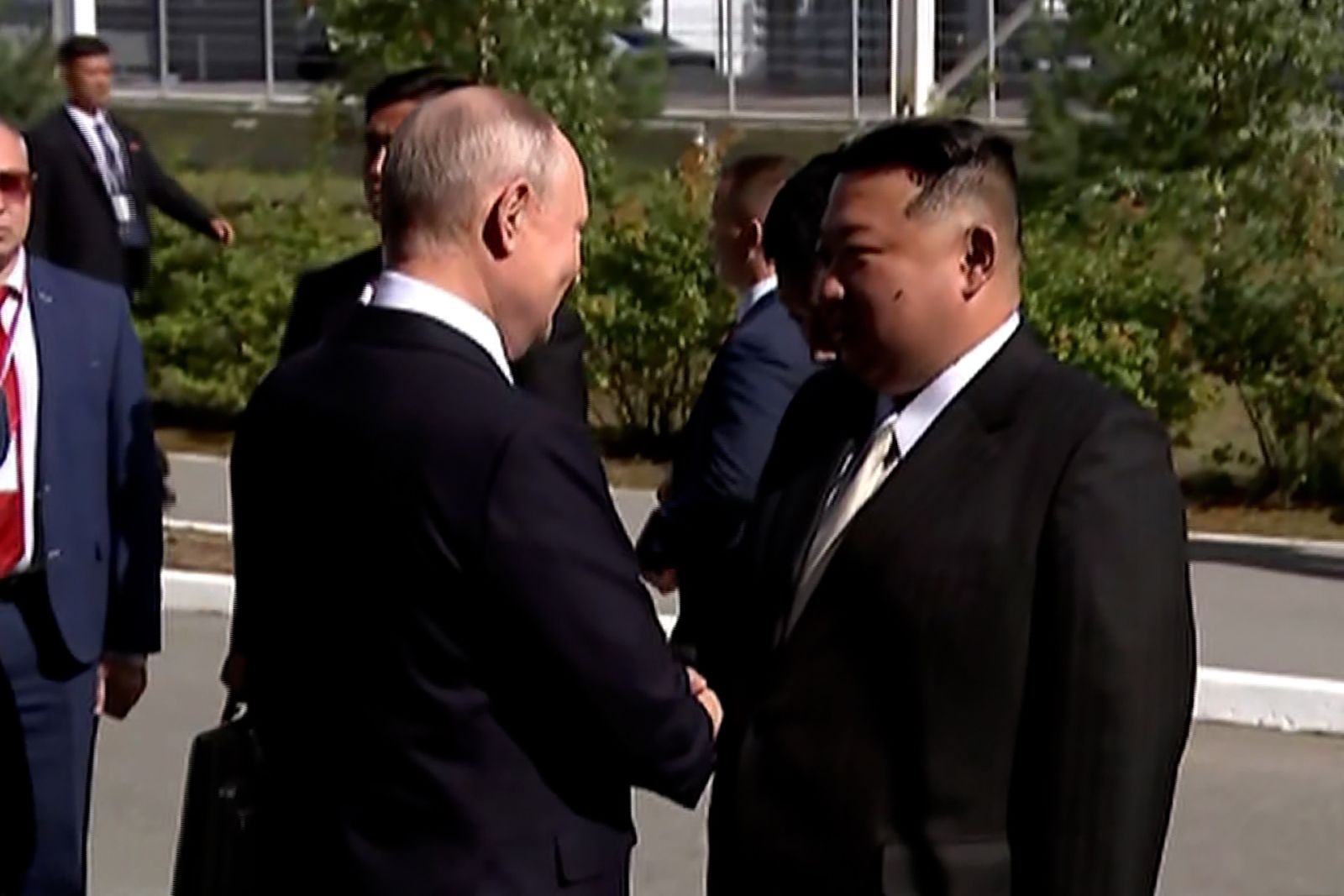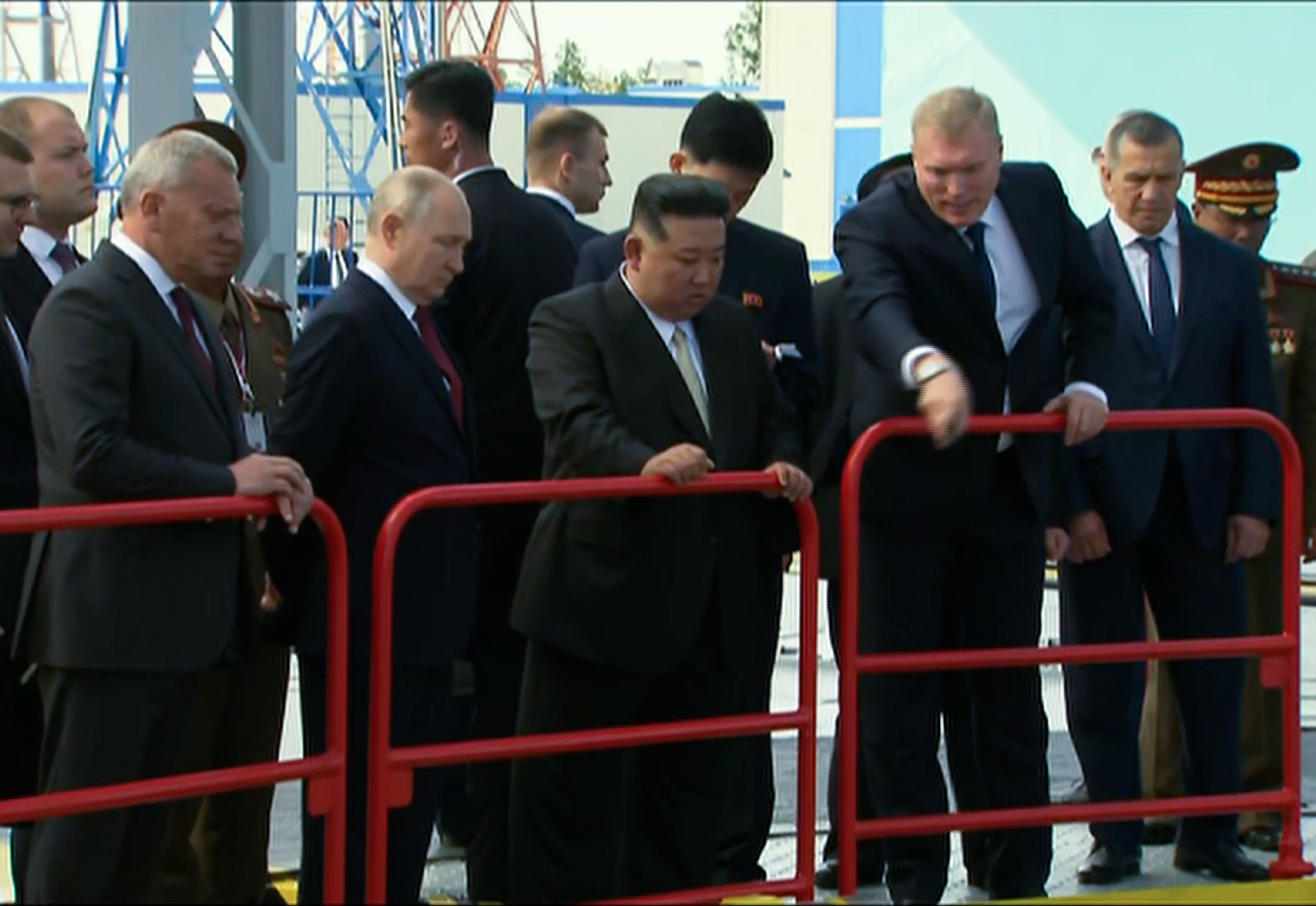Putin Explores Military Cooperation with Kim Jong Un as North Korea Endorses Russia’s War on Ukraine

Putin Explores Military Cooperation with Kim Jong Un as North Korea Endorses Russia’s War on Ukraine
In a surprising turn of events, Russian President Vladimir Putin and North Korean leader Kim Jong Un met at the Vostochny Cosmodrome in Russia’s far east, sparking global interest and concern. The summit, held against the backdrop of Russia’s invasion of Ukraine and North Korea’s persistent nuclear ambitions, has raised eyebrows and intensified international isolation for both nations.
The gathering gained even more attention after U.S. officials issued warnings about Russia and North Korea’s potentially concerning alliance. There have been fears that Pyongyang might provide Moscow with weaponry to bolster its flagging war efforts in Ukraine, in exchange for advanced ballistic missile technology, despite international sanctions.
When asked about the possibility of military-technical cooperation during the summit, Putin responded cautiously but left the door open for discussion. He acknowledged the existing limitations imposed by international sanctions and treaties but hinted at potential areas where collaboration could occur.
“Russia fully complies with all these restrictions,” Putin affirmed in a statement to state-owned Russia “However, there are areas where we can engage in discussions and explore possibilities. Prospects do exist,” he added.
The international community is closely monitoring the situation, as this newfound rapport between Russia and North Korea could have far-reaching implications for global security, diplomacy, and the ongoing crisis in Ukraine.

A Diplomatic Dance Amidst International Isolation
The meeting between Putin and Kim comes at a time when both nations are grappling with international isolation and criticism for their respective actions on the world stage.
Russia’s invasion of Ukraine, which began several months ago, has led to widespread condemnation, economic sanctions, and a severe strain on its diplomatic relations with Western countries. The conflict has resulted in a humanitarian crisis, with thousands of civilians displaced and numerous casualties reported. Efforts to negotiate a peaceful resolution have so far proven futile.
North Korea, on the other hand, has been under international scrutiny for its persistent pursuit of nuclear weapons and ballistic missile technology. A series of missile tests and nuclear developments have drawn stern rebukes from the United Nations and key players in the region, including South Korea and Japan.
In this context, the summit between Putin and Kim Jong Un raises questions about their shared motives and the potential consequences for global stability.
Possible Implications of Military Cooperation
The international community has expressed deep concern over the possibility of military cooperation between Russia and North Korea. The fear is that such collaboration could escalate regional tensions and further complicate ongoing conflicts, particularly in Ukraine.
While both leaders have been somewhat vague about the specifics of their discussions, the prospect of Pyongyang providing weaponry to Moscow in exchange for advanced missile technology is a cause for alarm. This could potentially strengthen Russia’s military capabilities in Ukraine and prolong the conflict, leading to more casualties and destruction.
Moreover, the exchange of technology and military expertise could have wider implications for global security. The international community has long been concerned about North Korea’s willingness to export its missile technology to other rogue states or non-state actors. If this cooperation were to materialize, it might exacerbate existing concerns about the proliferation of advanced weaponry.

International Response
The summit has not gone unnoticed by the international community, which has been quick to react to the news. Western nations, particularly the United States and its European allies, have expressed deep reservations about any potential military cooperation between Russia and North Korea.
U.S. State Department spokesperson Jennifer Psaki stated, “We are closely monitoring the situation and are deeply concerned about any attempts to further destabilize the region. We call on all parties involved to prioritize diplomacy and peaceful solutions.”
The European Union issued a statement expressing similar concerns, emphasizing the need for a peaceful resolution to the Ukraine crisis and the denuclearization of North Korea.
China, a key ally of North Korea, has also voiced its opinion. Chinese Foreign Ministry spokesperson Hua Chunying stated, “We hope that all parties involved will exercise restraint and work towards a peaceful resolution. Stability in the region is of paramount importance.”
The Broader Geopolitical Context
The summit between Putin and Kim Jong Un is occurring against a backdrop of shifting global power dynamics. Russia’s strained relations with the West, particularly the United States and European Union, have pushed Moscow to seek alternative partnerships and alliances.
For North Korea, which has long been isolated due to its nuclear ambitions and human rights abuses, strengthening ties with Russia could provide a lifeline and access to vital resources, including food and energy supplies.
The growing closeness between Russia and North Korea raises questions about the role of China, which has traditionally been the key player in the region. China has maintained a delicate balancing act, attempting to exert influence over North Korea while engaging in economic and political partnerships with Russia. Any significant shift in the dynamics of this triangular relationship could have profound consequences for the region’s stability.

Conclusion: Uncertainty in a Complex Landscape
As the summit between Putin and Kim Jong Un concludes, the world watches with a mixture of curiosity and trepidation. The possibility of military cooperation between Russia and North Korea, given their track records and global ambitions, is a cause for concern.
The international community’s response will be critical in shaping the future trajectory of these developments. Diplomacy, dialogue, and a commitment to peaceful resolutions must remain at the forefront of efforts to address the challenges posed by this newfound alliance.
For now, the world waits to see how this diplomatic dance will unfold, and whether it will lead to further instability or pave the way for constructive engagement and resolution of ongoing crises. One thing is certain: the global landscape has become even more complex and uncertain with this unexpected turn of events.



